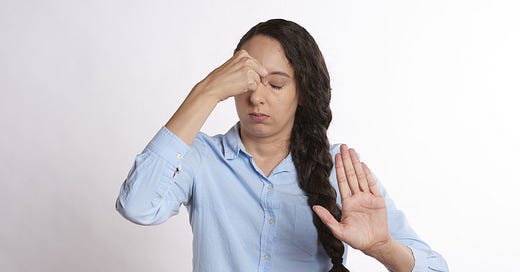The Guardian recently reported that puking has become endemic in movies, with one recent film spending a full fifteen minutes on a (satirical) puke fest. The writer seemed to think this was a recent cultural phenomenon and called it a tired way of shocking viewers.
It truly is tired and has been with us in film and fiction for a very long time now.
I remember the very first time I saw a character throw up in a movie and how jarring it was. In the late 70s/early 80s I lived in New York and used to see a new movie every Friday on the East Side with a college buddy. Some of the best were All The Presidents' Men, All That Jazz, The Life of Brian, and Alien, which we saw with a rambunctious crowd that treated the film like The Rocky Horror Show, shouting things like "Don't go in there! Didn't I tell you not to go in there?!"
She and I weren't dating exactly, but we were the last two members of our group who were single and had once promised on the Staten Island Ferry after a wedding reception that if we hadn't found a partner in five years we would marry each other. We were, as you can guess, both drunk that night--though it sounds like the opening of a movie.
Ironically, perhaps, that particular Friday night of cinematic puking, the movie was An Unmarried Woman where the star, Jill Clayburgh, discovers her husband wants to leave her for a younger woman. After leaving the restaurant where she's been hit by his news, she stops on the street and heaves.
While I haven't tracked literary vomit that far back in fiction, I remember how it showed up over twenty years ago in my own life when I taught a week-long writing workshop in Kentucky. Five or six of the stories that students shared with me and each other before the workshop began had at least one character who barfed in response to bad news or a surprise. Or kind of just because, it seemed.
Organizers told me sotto voce that the biggest local crop was marijuana, but I don't think there was any kind of connection as the students were from various states. I brought the subject up (sorry) the first day we met. The group seemed surprised to see vomitting show up so often in their manuscripts—and maybe a little abashed. I asked them how often they had thrown up in their lives. The group answer was unanimous that it hadn't happened very often. And what was the cause? Some said when they were ill, others when they were drunk, one when she had a fierce migraine.
None of the situations in their stories fit those situations.
Okay. So we moved on to their stories. What point were they trying to make in that fictional moment where their character rolfed? The answers varied, but the common denominator was that they were trying to show how affected the character was, whether by fear, horror, shock, disgust, or depression.
"Well," I asked, what happens to you physically when you feel any of those things, aside from puking or wanting to puke?" The answers came in a rush: dry mouth, getting sweaty, scowling, feeling cold, trembling, eyelids fluttering, crying, headache, hands shaking, lips trembling, wanting to hide, feeling frozen, feeling paralyzed while desperate to run away, hunger, thirst--and much more. You could see them recognize, as the room filled with these images, that there were far more creative ways to indicate intense emotion than a gastrointestinal event.
But that seems like go-to shorthand for writers and screenwriters, and on screen, we often get to see the vomiting itself--as if the sound from another room, say, isn't enough. If it's some kind of proof that the character really is upchucking I can do without it.
Because it sometimes make me nauseous. Or nauseated. Either one is fine.





I published a story this year in which my main character throws up due to nerves and now I am filled with regret…